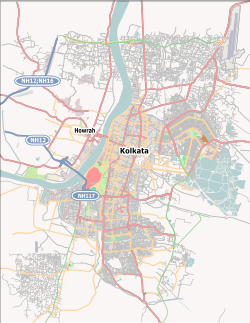
Summary
Surendranath Law College (Bengali :সুরেন্দ্রনাথ আইন কলেজ) formerly known as Ripon College) is an postgraduate law college affiliated with the University of Calcutta. It was established in Kolkata in the Indian state of West Bengal in 1885 by a trust formed by the nationalist leader, scholar and educationist Surendranath Banerjee, a year after he founded Surendranath College.[1] This is now regarded one of the oldest Law college of British India.[2][3]
 | |
| Type | postgraduate Law college |
|---|---|
| Established | 1882 |
| Principal | Dr. Mohammadi Tarannum (Vice-Principal) |
| Location | , , 22°34′10″N 88°22′02″E / 22.5695344°N 88.3672145°E |
| Campus | Urban |
| Affiliations | University of Calcutta |
| Website | snlawcollege |
 Location in Kolkata  Surendranath Law College (India) | |
History edit
The first name of the college was Presidency School in 1882,[4] when it was handed over to Sri Banerjee on 1 January 1884. That same year the Post-Graduate Department of Law was extended, and it was affiliated to the Calcutta University as an independent professional college in 1885. Banerjee renamed the school the Presidency Institution and brought it to the status of a college affiliated to the F.A. standard. The name was later changed to Ripon College, named after the British Viceroy George Robinson, 1st Marquess of Ripon.[5][6] The name was changed again in 1949 to honour its founder Sri Surendranath Banerjee.[7][8] The women's section of the college was founded in 1931 by Mira Datta Gupta, its first principal. Swami Vivekananda delivered his first address in Calcutta from the rostrum of this college on his return from Chicago after his famous deliverance at the Parliament of the World's Religions in Chicago in 1893.[9] In 1911, Rabindranath Tagore read out at this college one of his essays dealing with the twin subjects of separatism to be found among many of countrymen and national integration.[10][11] This college was recognised by the University Grants Commission in 1972.[11] The college now offers LLM courses.[citation needed]
Notable alumni edit
- Dr. Rajendra Prasad - The first President of India.
- Harendra Coomar Mookerjee - The first Governor of West Bengal.
- Sir Bijan Kumar Mukherjea - The first Bengali Chief Justice of the Supreme Court of India.
- Birendranath Sasmal - Nationalist barrister and politician.[10]
- Manmatha Nath Mukherjee - Judge, Calcutta High Court and Bengali jurist
- Mohammad Mohammadullah - President of Bangladesh[12]
- Panchanan Barma - Social reformer
- Dhirendranath Datta - Indian Freedom fighter and Bangladeshi activist.
- Khondakar Abu Taleb - Bangladeshi journalist and Martyr
- Shahidullah Kaiser - Bengali intellectual and Martyr
- Phani Bhushan Majumder - Former minister of Bangladesh[13]
- Rabin Deb - Bengali politician
- Golam Rahman (writer) - Bengali writer
- Aniruddha Bose - Judge of the Supreme Court of India
- Abdul Matin Chaudhury (1895-1948) - Muslim league politician[14]
- Mosharraf Hossain - Member of Constituent Assembly of Bangladesh, founding vice-president of JASAD.
See also edit
References edit
- ^ Chisholm, Hugh, ed. (1922). . Encyclopædia Britannica (12th ed.). London & New York: The Encyclopædia Britannica Company.
- ^ Dr. Somnath Mitra, Piyas (2002). From the principal's Desk. kolkata: Chatra Sansad. p. 13.
- ^ "Surendranath Law College Kolkata". highereducationinindia.com. Retrieved 30 May 2017.
- ^ "Book review 'A Nation in Making': Banerjea's nation-A man and his history". Retrieved 24 December 2018.
- ^ Our Leaders. 1989. ISBN 9788170114871. Retrieved 24 December 2018.
- ^ Meenakshi Mukherjee (2009). An Indian for All Seasons: The Many Lives of R.C. Dutt. ISBN 9780143067894. Retrieved 24 December 2018.
- ^ "Sir Surendranath Banerjea". Retrieved 24 December 2018.
- ^ Kunal Chakrabarti, Shubhra Chakrabarti (22 August 2013). Historical Dictionary of the Bengalis. ISBN 9780810880245. Retrieved 24 December 2018.
- ^ Pinakpani (24 November 2019), English: Surendranath Law College, former Ripon College in Sealdah, Kolkata, retrieved 2 November 2021
- ^ a b SURENDRANATH LAW COLLEGE. "About us". snlawcollege.ac.in. Retrieved 25 February 2017.
- ^ a b Brief History. "Surendranath College". surendranathcollege.org. Retrieved 25 February 2017.
- ^ "Mohammadullah, Mohammad". Retrieved 24 December 2018.
- ^ "Reminiscence of Revolutionary Leader Phani Bhusan Majumder". asiantribune.com. Retrieved 24 December 2018.
- ^ Shibly, Atful Hye (2011). Abdul Matin Chaudhury (1895-1948): Trusted Lieutenant of Mohammad Ali Jinnah. Juned Ahmed Choudhury. ISBN 978-984-33-2323-1.
External links edit
- Surendranath Law College


